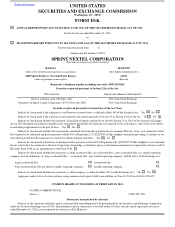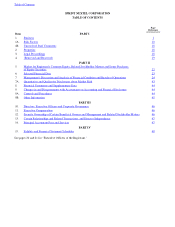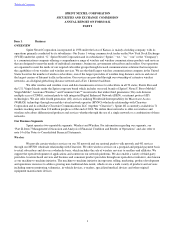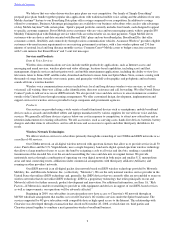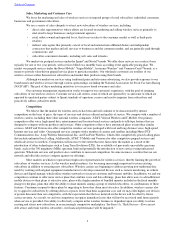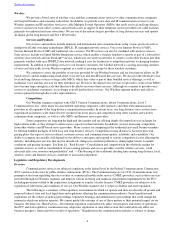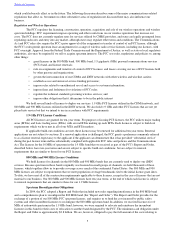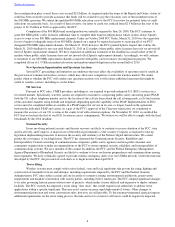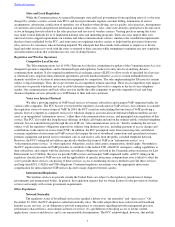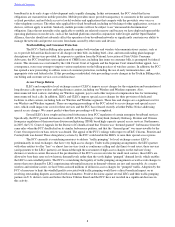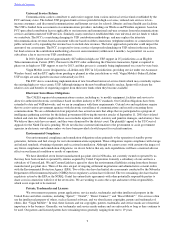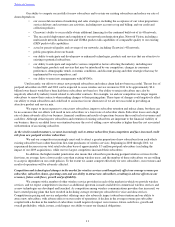Sprint - Nextel 2010 Annual Report Download - page 10
Download and view the complete annual report
Please find page 10 of the 2010 Sprint - Nextel annual report below. You can navigate through the pages in the report by either clicking on the pages listed below, or by using the keyword search tool below to find specific information within the annual report.
broadband is in its early stages of development and is rapidly changing. In this environment, the FCC stated that lesser
obligations are warranted on mobile providers. Mobile providers must: provide transparency to consumers in the same manner
as fixed providers; and not block access to lawful websites and applications that compete with the provider's own voice or
video telephony services. The other rules applicable to fixed broadband, including no blocking of other applications, services or
devices, will not apply to mobile. Similarly, mobile providers will not be subject to an "unreasonable discrimination"
obligation. Since the net neutrality rules applicable to mobile are relatively narrow and because we have deployed open mobile
operating platforms on our devices, such as the Android platform created in conjunction with Google and the Open Handset
Alliance, the rules should not adversely affect the operation of our broadband networks or significantly constrain our ability to
manage the networks and protect our users from harm caused by other users and devices.
Truth in Billing and Consumer Protection
The FCC's Truth in Billing rules generally require both wireline and wireless telecommunications carriers, such as
us, to provide full and fair disclosure of all charges on their bills, including brief, clear, and non-misleading plain language
descriptions of the services provided. In response to a petition from the National Association of State Utility Consumer
Advocates, the FCC found that state regulation of CMRS rates, including line items on consumer bills, is preempted by federal
statute. This decision was overturned by the 11th Circuit Court of Appeals and the Supreme Court denied further appeal. As a
consequence, states may attempt to impose various regulations on the billing practices of wireless carriers. In addition, the FCC
has opened a new proceeding to address issues of consumer protection, including the use of early termination fees, and
appropriate state and federal roles. If this proceeding or individual state proceedings create changes in the Truth in Billing rules,
our billing and customer service costs could increase.
Access Charge Reform
ILECs and competitive local exchange carriers (CLECs) impose access charges for the origination and termination of
long distance calls upon wireless and long distance carriers, including our Wireless and Wireline segments. Also,
interconnected local carriers, including our Wireless segment, pay to each other reciprocal compensation fees for terminating
interconnected local calls. In addition, ILECs and CLECs impose special access charges for their provision of dedicated
facilities to other carriers, including both our Wireless and Wireline segments. These fees and charges are a significant cost for
our Wireless and Wireline segments. There are ongoing proceedings at the FCC related to access charges and special access
rates, which could impact our costs for these services and the FCC has released recently a further Public Notice addressing
special access charges. We cannot predict when these proceedings will be completed.
Several ILECs have sought and received forbearance from FCC regulation of certain enterprise broadband services.
Specifically, the FCC granted forbearance to AT&T, ACS Anchorage, CenturyLink (formerly Embarq), Frontier and Citizens
from price regulation of their non-time division multiplexing (TDM) based high-capacity special access services. Furthermore,
in 2007, the U.S. Court of Appeals for the District of Columbia found that Verizon was “deemed granted” forbearance from the
same rules when the FCC deadlocked on its similar forbearance petition, and that the “deemed grant” was unreviewable by the
Court. Our request for en banc review was denied. The appeal of the FCC's rulings with respect to AT&T, Citizens, Frontier and
CenturyLink was denied. These deregulatory actions by the FCC could enable the ILECs to raise their special access prices.
The FCC currently is considering measures to address “traffic pumping” by local exchange carriers (LECs)
predominantly in rural exchanges, that have very high access charges. Under traffic pumping arrangements, the LECs partner
with other entities to offer “free” or almost free services (such as conference calling and chat lines) to end users; these services
(and payments to the LECs' partners) are financed through the assessment of high access charges on the end user's long
distance or wireless carrier. Because of the peculiarities of the FCC's access rate rules for small rural carriers, these LECs are
allowed to base their rates on low historic demand levels rather than the vastly higher “pumped” demand levels, which enables
the LEC to earn windfall profits. The FCC is considering the legality of traffic pumping arrangements as well as rule changes to
ensure that rates charged by LECs experiencing substantial increases in demand volumes are just and reasonable. As a major
wireless and wireline carrier, we have been assessed millions of dollars in access charges for “pumped” traffic. Adoption by the
FCC of measures to limit the windfall profits associated with traffic pumping would have a direct beneficial impact on us
resolving outstanding disputes associated with such matters. Positive decisions against several LECs and their traffic pumping
partners in U.S. district courts and before the Iowa Utilities Board and the FCC have not resulted in a significant decrease in
this activity.
Table of Contents
8

